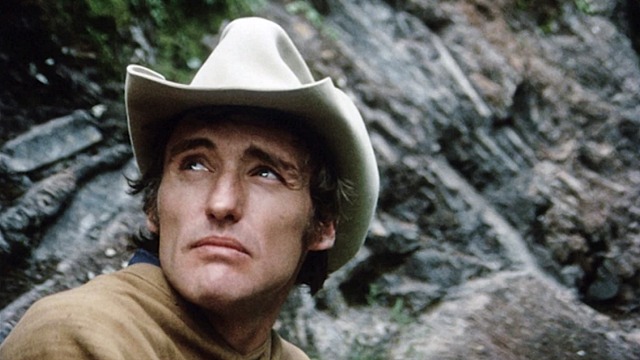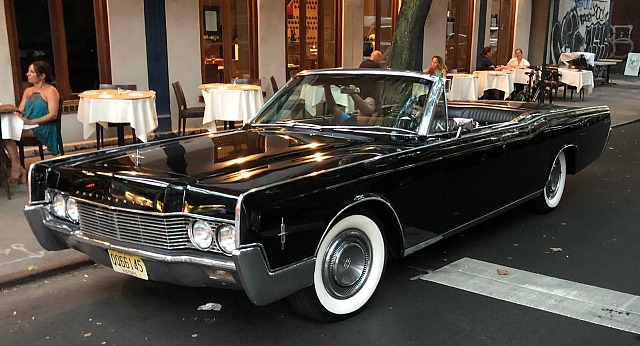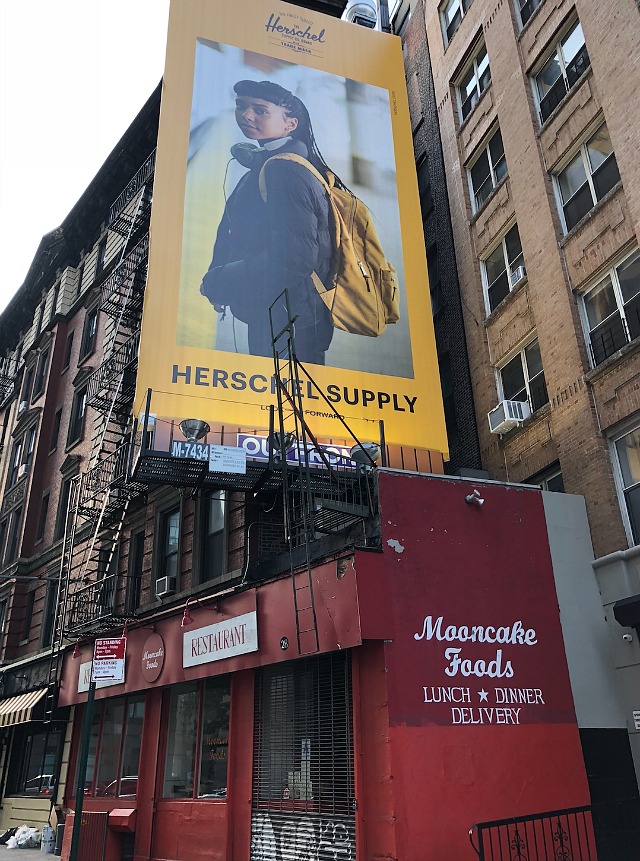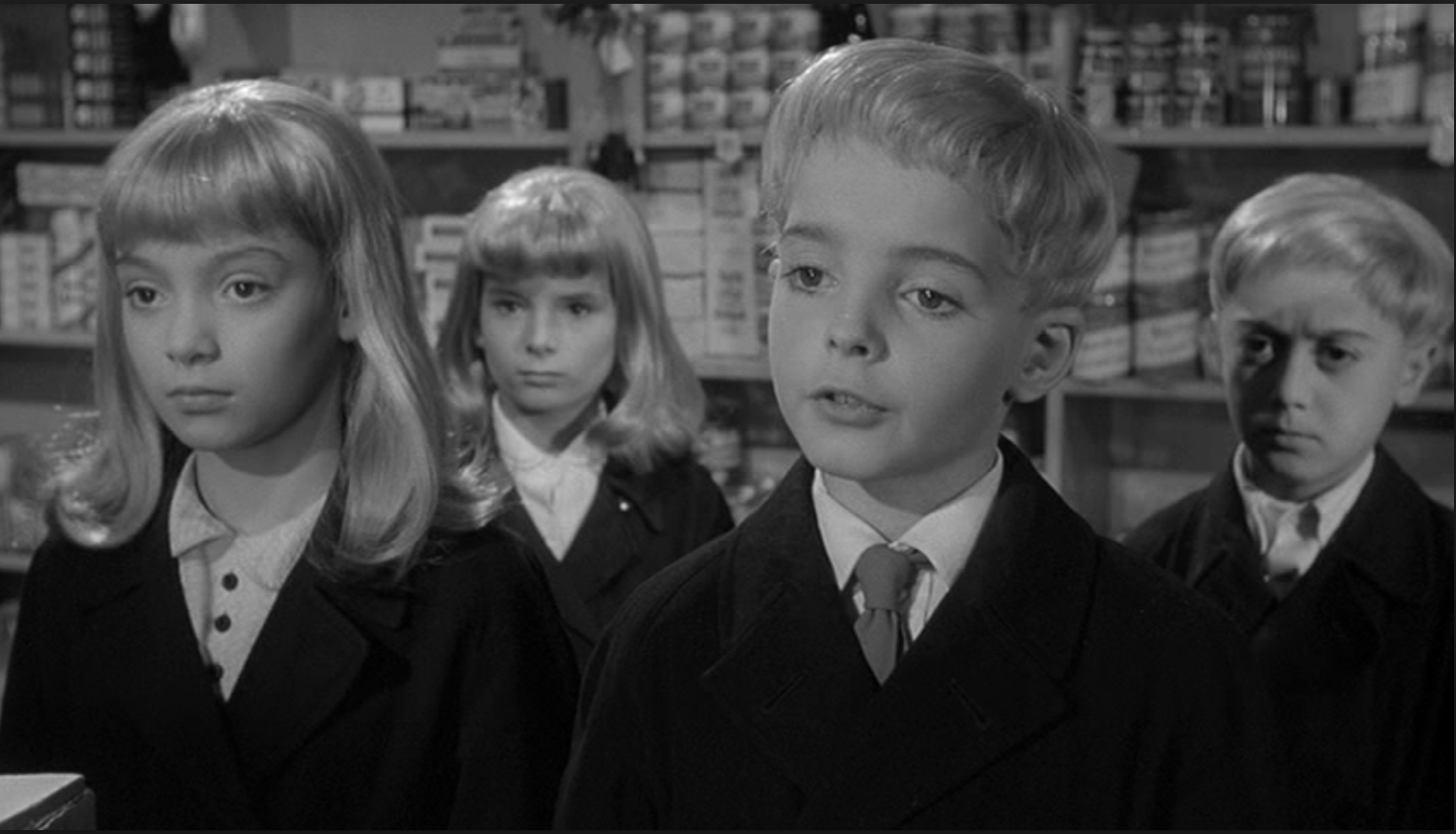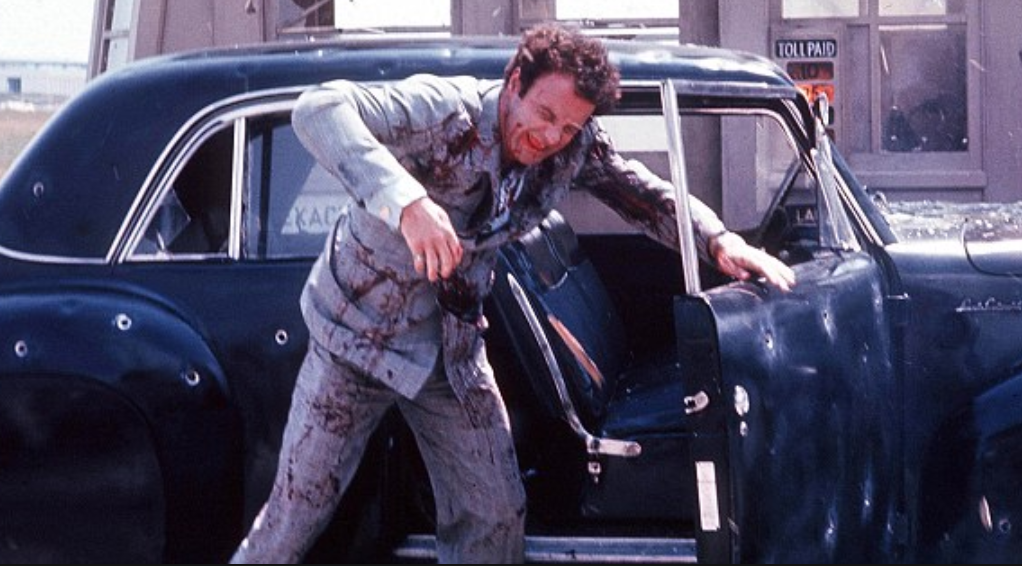Sacha Baron Cohen: “Do you think there’s any way that you could get President Trump to give me a golden shower?” Joe Arpaio: “In Finland?” SBC: “Or in America or in Washington?” Arpaio: “Well, I’ll tell you one thing, if he sees this and the way you’re speaking, he’s gonna like you. Because you think like he thinks.”
 Jeffrey Wells
Jeffrey Wells
A Journalist Is Probably Going To Get Attacked
And when it happens, God forbid, it’ll mostly be Trump’s fault, if not entirely.


Half-Interesting, 47-Year-Old Wipeout
Earlier today I saw Dennis Hopper‘s The Last Movie at the Metrograph. The first third is half-interesting so I’m not sorry I saw it, but it’s mostly a sloppy mess, and that’s entirely on Hopper — the director, editor and star. The middle portion and final third are boring for the most part, and at times repellent. I read somewhere that Stewart Stern‘s original screenplay told an actual story that made sense, but the way it’s been cut together is lazy and haphazard; at times it almost feels spazzy. The film is interesting here and there (I liked the “SCENE MISSING” inserts and the fact that the main-title card doesn’t appear until 20 minutes in) but there’s no tension in any of it.
And Hopper’s lead character, a stunt coordinator named Kansas, is just an ass. A weak, squishy, impulsive jellyfish whom you half-tolerate at first, and then you grow to vaguely dislike and then hate him by the end of the first hour. He doesn’t die soon enough.
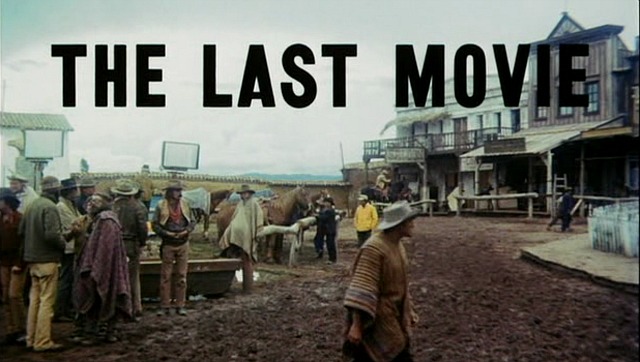
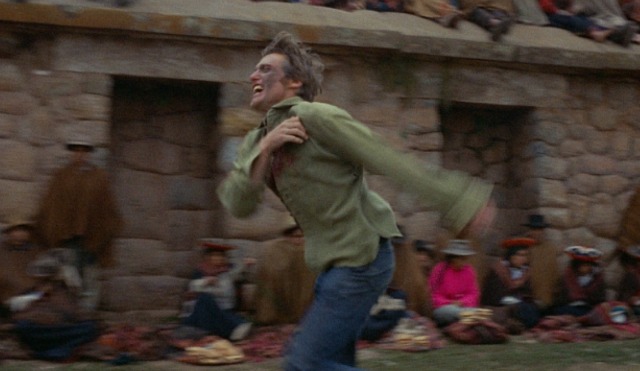
The Last Movie is set in a Peruvian village (actually a small town named Chinchero) in the Andes foothills. It’s about a Sam Fuller-directed western shooting there, and some guy dying in a stunt accident and Kansas, who seems like a reasonably decent fellow at first, deciding to stay in the village when the film wraps. He hooks up with Maria (Stella Garcia), an attractive, good-hearted woman who may or may not be a prostitute.
Kansas gradually turns into a weasel, breaking poor Maria’s heart by coming on to another woman (Julie Adams, best known for The Creature From The Black Lagoon) in her presence.
Then what happens? Kansas gets worried about running out of funds (this didn’t occur to him when he decided to stay on?) and decides to invest $500 in a sketchy goldmine scheme that quickly goes south. And then some of the native Chincherans — this is the really stupid part — decide to start making their own imaginary film with pretend cameras and microphone booms made of wood, except they don’t understand play-acting and start engaging in real violence. And Kansas gets caught in the wringer.
The primitive-natives thing is patronizing. The locals aren’t some tribe of spear-throwing jungle dwellers but small-town guys who wear boots and jeans and use telephones and order drinks in bars, and yet the movie tells us they’re as clueless and cut off from 20th Century civilization as New Guinea cannibals. A crap premise. Maria is from the same town, remember, and she seems as attuned to the complexities of modern life as anyone. If you don’t buy the idea that the natives are unable to understand the concept of acting and pretending, The Last Movie collapses like a house of cards.
The best part of The Last Movie is the first-act footage of Michelle Phillips, who was around 26 when the film was shot in 1970 and really, really beautiful. My whole mood brightened when I saw her. She married Hopper not long after The Last Movie wrapped, but they got divorced after only eight days. (Married on 10.31.70, divorced on 11.8.70.)
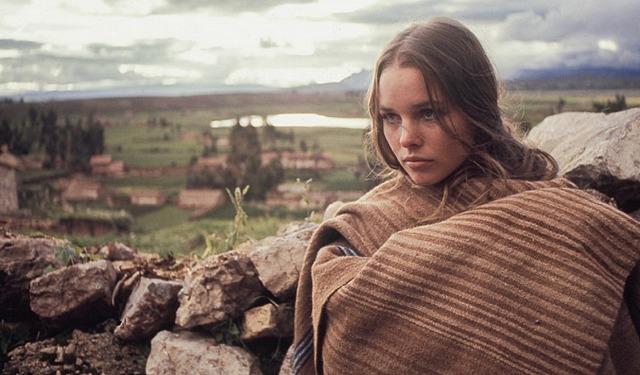
Michelle Phillips during filming of The Last Movie.
Hell Is Other Whistlers
I was sitting at a train station this morning (10:40ish) when all of a sudden I heard whistling coming from the parking lot. I don’t like whistlers any more than I like groups of women in bars who shriek and giggle after their second glass of wine, and so my first reaction was one of mild irritation. I looked around and didn’t see anyone. Then I heard it again. And then I saw him — an older guy in shorts, T-shirt, socks and tennis sneakers, slightly bent over as he shuffled along. It would be one thing if he was whistling “Don’t Let The Sun Go Down on Me” or “Beautiful Dreamer” or the Full Metal Jacket “Mickey Mouse Club” tune or even “Whistle While You Work,’ but no recognizable tune could be discerned.
What he was doing, in fact, was idiot-whistling — just hitting random notes and scales and feeling peppy for the hell of it. I scowled and seethed, not at the guy but at life and happenstance. There was nothing to be done or said. I for one have never whistled in mixed company. I might whistle if I was walking all alone at night in the middle of the Sonoran desert or along the beach in New Jersey or if I was in downtown Baghdad and looking to brush off a feeling of fear, but never at a suburban train station. I know I sound like a miserable misanthrope, but all he had to do was whistle a melody I could follow. And he refused.
Considering Superhero Mythology as Authoritarian
The MCU and D.C. superheroes are always presented as smirky, mild-mannered individualists — unpretentious, anti-corporate, egalitarian types with extraordinary powers, rock-hard bods and dry senses of humor. In a phrase, friends of the common man. I’m not saying they aren’t that or that the general superhero mythology is a mountain of bullshit, but just for the sake of argument or conjecture imagine that the superhero thing is all about authority, and that fans of superhero films are, in a sense, sheep or cattle. As in (a) “they love to eat that grass” and (b) “nothing makes them feel better than to obey by buying tickets.”
What’s the first requirement of any authoritarian figure? Obviously a widely accepted belief in his or her power and omnipotence. But the authoritarianism I’m speaking of isn’t a matter of this or that costumed brand monkey…Captain America, Batman, Mystique, Black Widow, Black Panther, etc. I’m speaking of the corporate authority wielded by the Marvel (Disney/Fox) and D.C. (Warner Bros.) guys. They’re only in it for the money, of course, but imagine if they also loved the power and control and had begun to get used to that extra-special warm feeling in their blood…that feeling of having built a super-empire and having convinced tens of millions worldwide to follow with a high degree of worship and obedience that would be the envy of any strongman dictator.
I’m not saying this is the case today, but imagine if it were. Because once you let this scenario into your head, everything becomes clear.
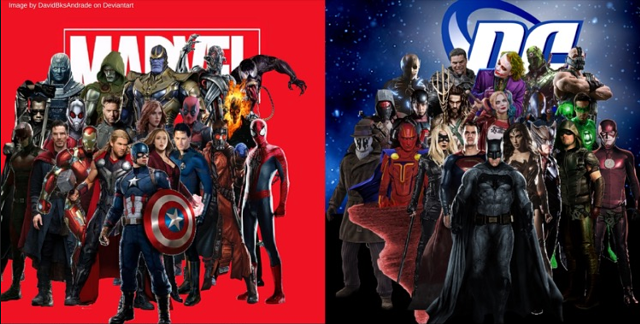
Distressed Bohemian
For decades my default definition of “taste” was one attributed to Francois Truffaut — “Taste is a result of a thousand distastes.” Which feels right as rain and a comfortable concept in this corner. If Hollywood Elsewhere is about anything, it’s about distastes. (And therefore about loving and worshipping things that don’t inspire pique or revulsion all the more.)
This morning I decided to add a supplement. It comes (or came rather) from London designer Christopher Gibbs, a renowned interior designer, antiques dealer and fashion maven who died two or three days ago at age 80.
Taste, Gibbs said, “is something you catch, like measles or religion.”
18 years ago Christopher Mason explained that Gibbs “is a leading proponent of that elusive brand of anti-decoration, high-bohemian taste favored by self-confident Englishmen, a look based on well-worn grandeur, disarming charm and unexpected contrasts.
“The magic is in the mix of masterpieces and oddities — like an assemblage of refined and wild-card house guests who mysteriously combine to create the ideal convivial country-house weekend. The allergy here is to the banal, not to dust.”

This aesthetic, which I’ve sworn by (or tried to swear by) for decades, is all but dead in this country, certainly among the flamboyantly wealthy. It’s been killed for the most part by the wannabe-Kardashian mentality that says everything has to look obnoxiously expensive and McMansiony, which is to say grand and over-sized and generally lacking in aroma and historic texure, which is to say clueless for the most part.
Gibbs: “I like things in their natural state — people especially. As life goes by, that’s what I admire: objects and people that are unmonkeyed with, that are themselves, not trying to be something else.”
The Times obit, written by Sam Roberts, reminds that Gibbs’ Cheyne Walk home in London “was borrowed by Michelangelo Antonioni for the party scene in his movie Blow-up (1966) and by Kenneth Anger to shoot the occult film Lucifer Rising (’72).
Gibbs also designed what he called the “earthly paradise” inhabited by the has-been rock star played by Mick Jagger in Donald Cammell and Nicolas Roeg’s film Performance (’70). A similar aesthetic was used for the spacious vampire home occupied by Tilda Swinton and Tom Hiddleston in Jim Jarmusch‘s Only Lovers Left Alive.
Eyes Have It
There have been three Children of the Damned films — Wolf Rilla’s 1960 British-produced feature, a 1964 sequel called Children of the Damned and John Carpenter‘s 1995 remake of Rilla’s original, which was based upon John Wyndham‘s “The Midwich Cuckoos,” a 1957 novel.
The Rilla isn’t anyone’s idea of a knockout, but it’s still the best, I think. Those glowing eyes and white-blonde hairdos, and those wonderfully crisp, steady-as-she-goes black-and-white compositions from dp Geoffrey Faithfull. The film serves as a metaphor, of course, for how older establishment types sometimes regard younger generations with disdain and repulsion, and sometimes even fear or panic. These aren’t our children — they look and behave like aliens.
Socrates and others of his generation felt this way about teenagers, of course, and this is definitely how the WWII generation saw stoned, shaggy-haired ’60s counterculture types in the late ’60s and early ’70s. I don’t see Millennials or GenZ-ers as especially odd or alarming because I’m an enlightened X-factor fellow with a background in authority-defying and psychedelic mysticism, but I do regard the brah culture uniform with absolute horror.
A respected Village of the Damned Bluray popped a week ago, and is available to stream.
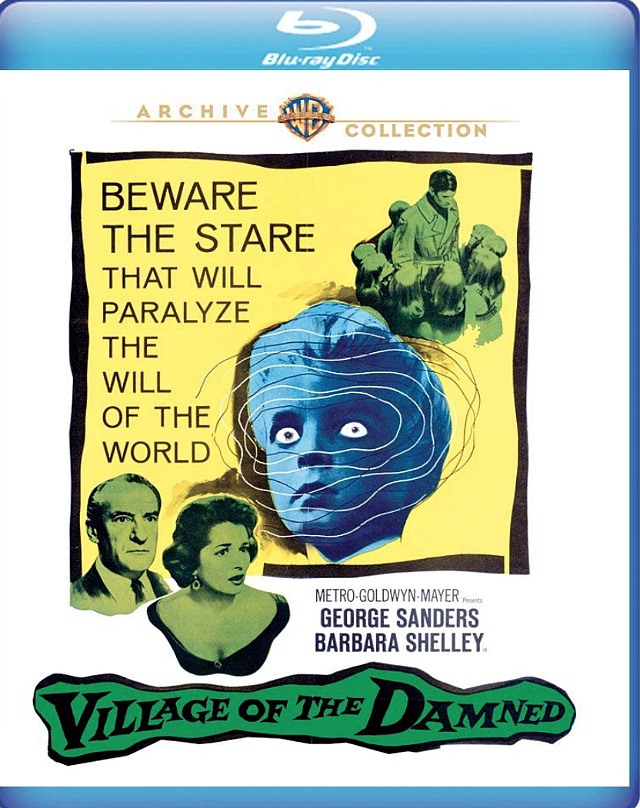
Son of “You Can’t Say Excited”
In an 8.4 N.Y. Times profile of legendary talk-show host Dick Cavett, Alex Williams includes the following passage: “In a landscape rebuilt for clickable clips, unscripted moments seem increasingly rare. ‘If I were doing a show today,’ Mr. Cavett said, ‘it would not include a nice actress who’s so ‘excited’ about her new movie, and so ‘excited’ about her director, and so ‘excited’ about the costumes. ‘Excited’ is a word that could easily be stricken from the show business vocabulary.”
HE-posted on 1.9.14: “In the realm of press releases no word is more phony sounding than ‘excited.’ Whenever someone is hired by a company of any size they’re always, always ‘excited’ about a great opportunity; ditto their employers; ditto any creative or business person or senior management type embarking on any entrepreneurial, cooperative or corporate venture.
“‘Excited‘ is so ubiquitous it’s almost scary. Because people in the business world refuse, bizarrely, to use any other word. Like it’s some kind of code. It’s so commonly used you can pretty much count on the person using it being…I don’t want to say they’re a political zombie but they’re certainly looking to blend in. I’m serious — anyone who says ‘I am very excited about this opportunity’ in a press release can and should automatically be perceived as a joiner, a go-alonger, a Zelig, a drone.
“If you’ve seen the John Carpenter film They Live, you know what kind of person I’m talking about.”
Fishing Line Squibs
Gunshot squibs are little micro-explosive devices that leak or spray dark-red glop to indicate that a character has been shot. They’re been used by filmmakers for the last half-century or so. The first time I noticed them was during the machine-gun slaughter scene at the end of Bonnie and Clyde. Since the early ’80s I’ve been on dozens of film sets and talked to two or three guys who knew all about squibbing, but I never once heard about squibs being activated by crew guys pulling on fly-fishing lines. These were apparently used in the gangland massacre of Sonny Corleone scene in The Godfather. It seems kind of silly to yank on two or three fishing lines in order to make a bullet hole or two appear. With the sound of rattling gunfire and the screaming and abundant bleeding and the fast cutting who’s going to notice if a little black hole or two suddenly appears on James Caan‘s face? Nobody.
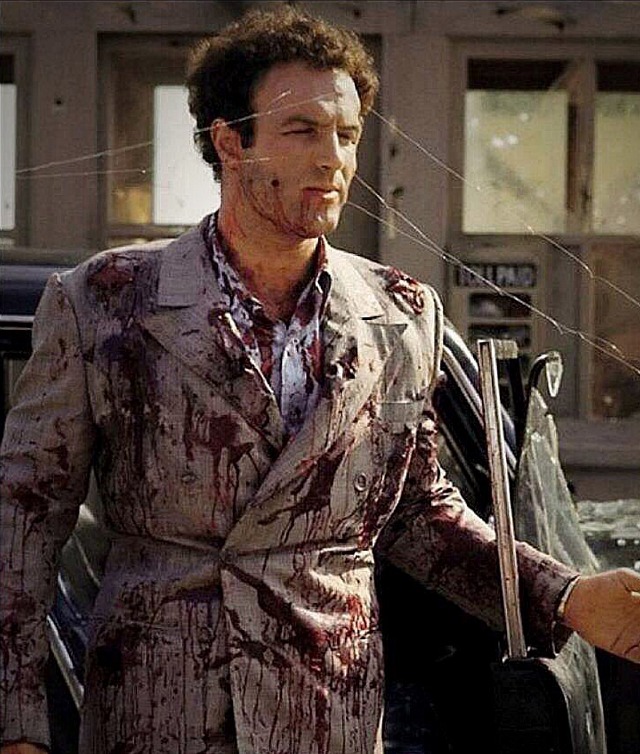
Early Detection of Death Knell Tremors
14 years ago I was talking to a gifted, highly respected, somewhat bitter guy who was well acquainted with how big-studio Hollywood worked. The subject was John Moore‘s Flight of the Phoenix, a commercially unsuccesful, not-so-hot remake of Robert Aldrich’s same-titled 1965 original with Dennis Quaid in the James Stewart role.
What may have seemed like an overly angry assessment from “bitter guy” 14 years ago is now par for the course. The production wings of major film studios are largely staffed by soul-less zombies who instinctively flinch at the idea of adult-friendly drama. Marketing films to the empty-Coke-bottle crowd is all. Now we say “of course!” but back then (three and a half years before Iron Man and the eventual MCU/D.C. takeover) it was different. Back then paying $100 million for a movie of this calibre ($65 million to shoot it, $35 million to sell it) seemed exorbitant and wasteful. Back then there was still a belief in some corners about mainstream movies occasionally serving adults.
Here’s how “bitter guy” described the Flight of the Phoenix back-story:
“It was going to be Deliverance in the Gobi desert. The script was about character with everyone slowly going insane as the days went on, and when the new plane was built the pilot [Quaid’s role] is reluctant to fly it because the desert crash was his fault and his confidence is shot.
“And he couldn’t be Mel Gibson. If it was Gibson you’d want to see him do it. You’d be waiting for that.
“Then the studio said they wanted the Bedouins to come back and attack the plane at the last minute, just as they were trying to lift off. But hold on. If the baddy Bedouins are close enough to regroup and gather their forces they must be within shouting distance of some kind of half-civilized outpost, so why don’t the survivors just walk to wherever that is? That didn’t get through. The studio didn’t care about that.
“It was the first movie I ever worked on in which notes on the script were sent along by the head of marketing. Mainly because suddenly the movie was costing $60 to $65 million dollars. The average movie costs $65 million, and then it’s $35 million to open it.
“This business has become so wag-the-dog, so marketing driven. And with $65 million being spent no one can look like they’re really hurt or dying, no one can lose their minds, there can’t be any swearing, and no heavy character stuff.
“There was another stranded-in-the-desert thing called The King is Alive. It was a Dogma movie, didn’t cost anything, same basic deal, people stranded in the wilderness. But on a stripped-down budgetary level. Hollywood doesn’t know how to make a film like that. They don’t want to know, I mean.
Ships vs. Planes
Posted on 12.28.04: There’s a scene in Titanic when Leonardo DiCaprio’s Jack Dawson — an independent-minded, self-starting, vaguely bumpkinish guy who lives by his own rules — sits down with a bunch of white-tie swells in the first-class dining room. Jack’s a little intimidated at first, but he stands his ground by being himself and explaining a personal philosophy that’s hard to disagree with, which is to always “make it count.”
It’s not a great scene, but a moderately satisfying one. It instills respect for Jack, and at the same time lends a certain warmth by saying that even the blue-bloods can relax and laugh at themselves and show respect for a guy who can look them in the eye.
There’s a scene in The Aviator when DiCaprio’s Howard Hughes — vaguely bumpkinish, independent-minded, self-starting, living by his own rules — sits down with a bunch of Connecticut swells, or more preicsely the family of his girlfriend, actress Katharine Hepburn.
Howard’s a little intimidated at first, but the Hepburns are absurdly rude and snooty to him, which leads to his getting testy and then a bit rude himself.
“We don’t care about money here, Mr. Hughes,” says Mrs. Hepburn.
“That’s because you have it,” Howard answers.
“Would you repeat that?”
“You don’t care about money because you have it,” he says again. “And you’ve always had it. My father was dirt poor when I was born…”
“Back in torrid Houston, this would be?” asks Mrs. Hepburn.
“Oh, shut up,” snaps Howard.
“Howard!” Kate exclaims.

